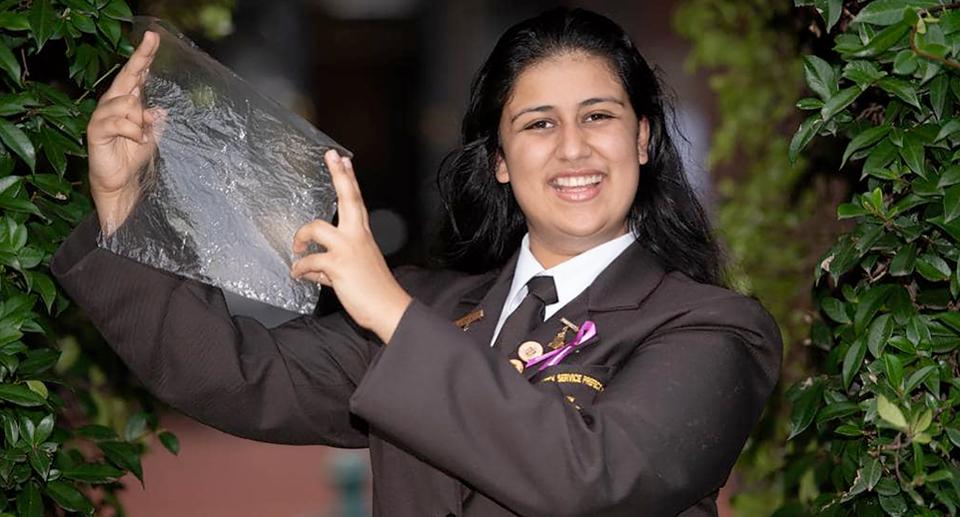
Medicine student’s environmental plastic entrepreneurship gains international attention, PhD’s documentary airs tonight, SACE COVID-19 leadership, a new book explores university protests against facism, and a new global effort to understand infection potential at the seaside.
Plastic entrepreneur chooses medicine future

A first year Flinders University medicine student has featured in US business magazine Forbes for her incredible achievement creating a new form of plastic, and a subsequent flow of awards that have come her way.
Angelina Arora created a strong, light plastic out of prawn shells that degrades in around 30 days.
Ms Arora began her experiments while at high school in New South Wales, experimenting with making plastic from starches for a science project.
She turned to prawn shells after noticing their similarity to plastic, capturing the attention of scientists with her early success and going on to win state and national competitions. This gave her access to university laboratories and more sophisticated equipment.
By combining chitin from the shells with fibroin, a protein found in silkworms, she developed new plastic prototypes.
Since then she has given a TED talk and came fourth in an international science competition.
Even with her achievements and interest in environmental manufacturing (including interest from potential commercial partners), the talented Ms Arora is looking forward to a future in medicine.
PhD Festival doco airs tonight (Tuesday) on ABC
A Flinders University PhD candidate’s documentary will air on ABC this Tuesday, 19 May, following the challenges faced by Adelaide Festival’s joint artistic directors Neil Armfield and Rachel Healy over 18 months as they programmed the 2020 Festival, its special 60th anniversary event.
Richard Jasek is well-known in Australian film, having directed episodes of numerous TV series including Neighbours, The Secret Life of Us, McLeod’s Daughters and many others, together with documentaries for TV. He commenced his PhD at Flinders last year.
The documentary, Getting Their Acts Together, forms part of his creative PhD in screen. It is a behind-the-scenes look at how Adelaide Festival artistic directors Rachel Healy and Neil Armfield put together the 2020 Adelaide Festival as COVID-19 loomed.
Mr Jasek says the 18-month marathon project continued to the end of the anniversary spectacular.
“As we followed the directors twice through Europe and back to Australia it became gradually apparent that getting their acts wasn’t as easy as the year before, and their most elusive quarry was the most critical: a major work of theatre to provide a focal point to their whole program.
“Then, with tens of thousands of people flocking to Adelaide, the rollout of the Festival itself in March 2020 was beset by trouble, culminating in with the tsunami of COVID-19 that very nearly shut it down.”
It will screen on ABC1 this Tuesday 19 May from 9:30 to 10:30pm.
Professor leads SACE COVID-19 response, joins international ethics council
Emeritus Distinguished Professor Iain Hay has been working on the SACE Board’s four-person COVID-19 Response Committee during the pandemic. This Committee has Board-delegated power to make changes to the SACE assessment regime in response to the impact of the COVID-19 virus and the disruption in schools.
After a ballot of its 12,000 members worldwide, Professor Hay has also been elected to the global Council of COPE (Committee on Publication Ethics), which delivers leadership on publication ethics and practical resources to educate and support its members, and provides a professional voice in current debates.
Book explores university protests against racism and fascism
 Dr Evan Smith recently published the book, No Platform: A History of Anti-Fascism, Universities and the Limits of Free Speech.
Dr Evan Smith recently published the book, No Platform: A History of Anti-Fascism, Universities and the Limits of Free Speech.
The first book to summarise the history of the tactic ‘no platforming’ at British universities since the 1970s, it looks at more than four decades of student protests against racist and fascist figures on campus.
The origins of the tactic are explored, dating back to the militant anti-fascism of the 1930s–1940s, to its development since the 1970s and application to targets over the last 40 years including sexists, homophobes, right-wing politicians and Islamic fundamentalists.
The book provides a historical intervention in the current debates over the alleged free speech ‘crisis’ perceived to be plaguing universities in Britain, as well as North America and Australasia. It has been published as part of Routledge’s Fascism and the Far Right series.
Global look at beach infection
Flinders University researchers Dr Graziela Miot Da Silva, Dr Harriet Whiley and Associate Professor Kirstin Ross have formed a global group to look at the potential for exposure to SARS CoV-2 (the causative agent of COVID-19) at the beach. The group includes researchers from across Australia, the US and Europe made up of oceanographers, microbiologists, virologists and environmental health risk assessors. The idea came about because of an article in the LA Times
Samples of seawater, beach sand and sea spray will be collected and analysed for the presences of coronaviruses and other common viruses that affect human health. Sampling will be done in concert across the globe on Sundays, starting next month.

